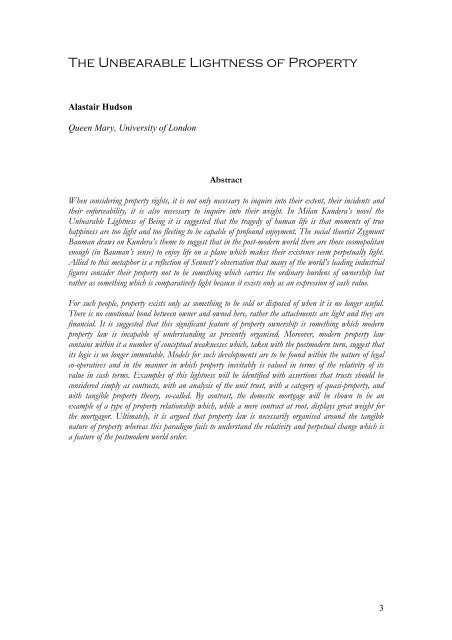The Unbearable Lightness of Property - alastairhudson.com
The Unbearable Lightness of Property - alastairhudson.com
The Unbearable Lightness of Property - alastairhudson.com
You also want an ePaper? Increase the reach of your titles
YUMPU automatically turns print PDFs into web optimized ePapers that Google loves.
<strong>The</strong> <strong>Unbearable</strong> <strong>Lightness</strong> <strong>of</strong> <strong>Property</strong><br />
Alastair Hudson<br />
Queen Mary, University <strong>of</strong> London<br />
Abstract<br />
When considering property rights, it is not only necessary to inquire into their extent, their incidents and<br />
their enforceability, it is also necessary to inquire into their weight. In Milan Kundera’s novel the<br />
<strong>Unbearable</strong> <strong>Lightness</strong> <strong>of</strong> Being it is suggested that the tragedy <strong>of</strong> human life is that moments <strong>of</strong> true<br />
happiness are too light and too fleeting to be capable <strong>of</strong> pr<strong>of</strong>ound enjoyment. <strong>The</strong> social theorist Zygmunt<br />
Bauman draws on Kundera’s theme to suggest that in the post-modern world there are those cosmopolitan<br />
enough (in Bauman’s sense) to enjoy life on a plane which makes their existence seem perpetually light.<br />
Allied to this metaphor is a reflection <strong>of</strong> Sennett’s observation that many <strong>of</strong> the world’s leading industrial<br />
figures consider their property not to be something which carries the ordinary burdens <strong>of</strong> ownership but<br />
rather as something which is <strong>com</strong>paratively light because it exists only as an expression <strong>of</strong> cash value.<br />
For such people, property exists only as something to be sold or disposed <strong>of</strong> when it is no longer useful.<br />
<strong>The</strong>re is no emotional bond between owner and owned here, rather the attachments are light and they are<br />
financial. It is suggested that this significant feature <strong>of</strong> property ownership is something which modern<br />
property law is incapable <strong>of</strong> understanding as presently organised. Moreover, modern property law<br />
contains within it a number <strong>of</strong> conceptual weaknesses which, taken with the postmodern turn, suggest that<br />
its logic is no longer immutable. Models for such developments are to be found within the nature <strong>of</strong> legal<br />
co-operatives and in the manner in which property inevitably is valued in terms <strong>of</strong> the relativity <strong>of</strong> its<br />
value in cash terms. Examples <strong>of</strong> this lightness will be identified with assertions that trusts should be<br />
considered simply as contracts, with an analysis <strong>of</strong> the unit trust, with a category <strong>of</strong> quasi-property, and<br />
with tangible property theory, so-called. By contrast, the domestic mortgage will be shown to be an<br />
example <strong>of</strong> a type <strong>of</strong> property relationship which, while a mere contract at root, displays great weight for<br />
the mortgagor. Ultimately, it is argued that property law is necessarily organised around the tangible<br />
nature <strong>of</strong> property whereas this paradigm fails to understand the relativity and perpetual change which is<br />
a feature <strong>of</strong> the postmodern world order.<br />
3













